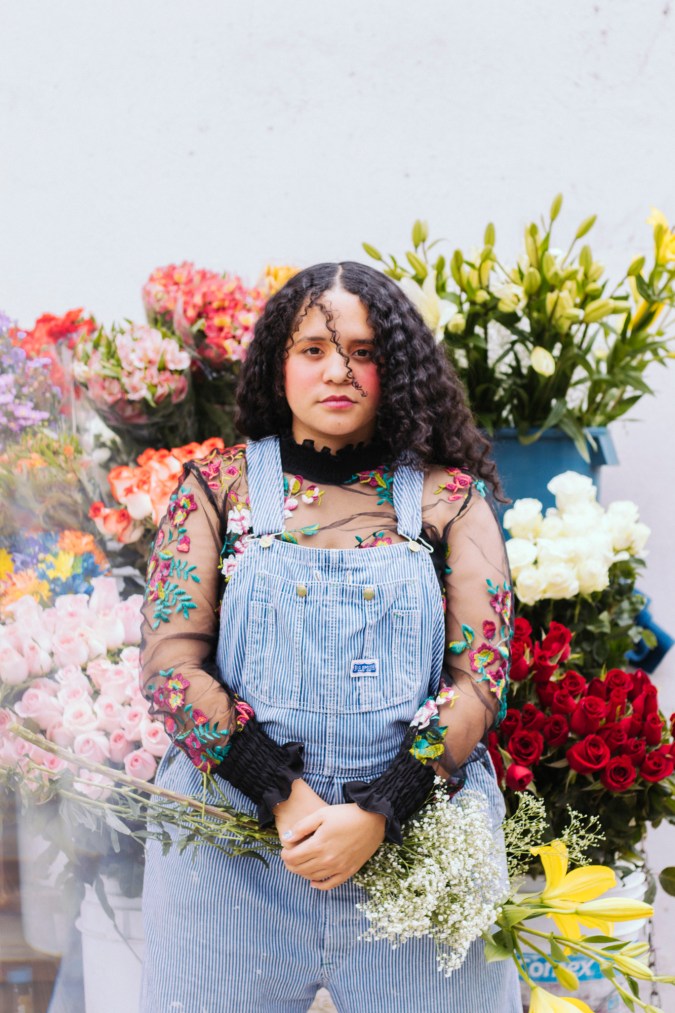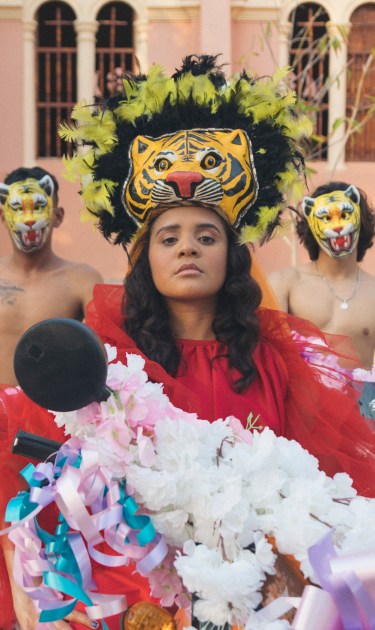Following a constantly shifting path that has taken her from singing in punk and metal bands as a teenager in Colombia, to winning Canada’s prestigious Polaris Prize for her sublime 2016 full-length debut La Papessa (the first Spanish-language album to nab the award), Lido Pimienta has deliberately strayed from formulaic avenues, often embarking on arduous, infinitely more fulfilling journeys. The acclaimed Colombian-Canadian multidisciplinary artist now unveils her long-awaited sophomore LP, Miss Colombia, out via Anti- on April 17th. The resplendent 11-track record once again casts Pimienta as a commanding avant-pop diva, still defiantly unencumbered by sonic trends and pop star beauty standards, and this time delving deeper into meditations on womanhood, motherhood, internalized racism, and diasporic disillusionment—recurring themes across her musical and visual work.
Miss Colombia makes for a bittersweet listening experience, at first drawing the listener in with its shimmering collisions of tropical pop, cumbia and Colombian porro while striking a somber tone driven by Pimienta’s cutting, melancholy lyrics. Lead singles “No Pude” and “Eso Que Tu Haces” radiate heartbreak and disappointment, which could lead listeners to believe Miss Colombia is a breakup album. However, Lido Pimienta has never been one to mourn a romance.
“It’s a collection of cynical love letters to Colombia,” Pimienta tells Remezcla. “The break up is with a country. All of us who are immigrants, we have the tendency to compare the country that we’re in and the one we left, often romanticizing how shit was when we were little.”

Pimienta wrote most of the songs for Miss Colombia in 2015, recording and producing with Astro’s Andres Nusser in Chile and Prince Nifty in Toronto. But the genesis of the album’s deceptively triumphant title came in 2016, after the infamous Miss Universe debacle where host Steve Harvey mistakenly proclaimed the contestant from Colombia victorious over her fellow finalist from the Philippines—inspiring the collective ire of Colombians worldwide and with it, a virulent racist online backlash.

I love my country but I fucking hate it. I miss it, but I don’t want to go there.
“The blindfold came off with the whole Steve Harvey fiasco,” remembers Pimienta. “The whole diaspora was disgusting. It made me feel like I couldn’t talk shit about Canada and act like everything in Colombia was hunky dory. I feel betrayed by my country on a regular basis. I love my country but I fucking hate it. I miss it, but I don’t want to go there. So that’s why the album sounds [conflicted]. I’m never going to write an album about some motherfucker. Hell no. But I cry for my country. Hay muchos hombres en el mundo, pero Colombia solo hay una.”
Pimienta’s swirling mixture of anger and sadness informs not only the themes of Miss Colombia, but also her methodology. “Pelo Cucu” is a disarming lullaby about the pervasive anti-blackness rampant across Latin America, where marrying into better (i.e. whiter, wealthier) families is an aspirational means of improving upon lineage and ridding the gene pool of their ‘pelo cucu’, a colloquialism referring to black hair textures. Later, with “Resisto y Ya,” Pimienta trades sarcasm for directness as she delivers a pulsating jolt of self-assurance reminding listeners being a queer, Afro-indigenous woman in this world is an act of resistance all on its own.
Similarly, on “Nada,” the album’s devastating third single featuring Bomba Estéreo front woman Liliana Saumet, the indomitable friends and frequent collaborators unspool the systemic pains of womanhood in dizzying depth. “Yo te soy sincero / si es que mañana muero / no le tengo miedo / pues soy mujer y llevo el dolor adentro,” sings Pimienta with the conviction of a woman and mother who has weathered the physical and emotional pains of abusive relationships, menstruation and childbirth. Saumet echoes Pimienta’s exhaustion, ready and eager to embrace death whenever it comes to offer sweet respite from the violence, fear and staggering expectations that burden women throughout most of their lifetimes. Refreshingly, each song dares to probe beyond straightforward accusations of racism and misogyny, instead taking ambitious, big-picture shots at more elusive philosophical maladies like discrimination, self-hatred and gender-based oppression.


“’Nada’ was the last song I wrote for Miss Colombia, which was about a week or two after I gave birth to my daughter [last year],” says Pimienta. “I remember rocking the baby back and forth, and the weight pushing down on my belly would hurt so much. But I’m the mom, so I had to push through the pain; rocking her, nursing her, singing to her. To be able to give birth you must be very strong and yet, this condition of womanhood automatically qualifies you as someone lesser, weaker and dainty.”
“I wanted the [“Nada”] video to feel colonial,” she adds, peeling back even more conceptual layers. “In the video, Liliana and I are sisters. She has a wedding ring and always walks in front of me. She’s guiding me, helping me kill myself, because she knows that I’m going to be married off to mejorar la raza, to mejorar la familia, because those are colonial views. In Colombia, when it comes to marriage, womanhood and the classic Colombian lady, you’re expected to be virginal, so that’s why I’m wearing white. So my sister who already went through this process is helping me get out at any cost.”
The Lido Pimienta and Paz Ramírez co-directed clip for “Nada” was shot near Saumet’s home in Santa Marta, while “Eso Que Tu Haces” was filmed over the course of three days in San Basilio de Palenque—the first freehold of escaped slaves in the colonial Americas, established in the late 1600s. “Eso Que Tu Haces” puts a loving spotlight on Palenque’s centuries of tradition, also providing an intimate glimpse into Pimienta’s past. The clip features shots of a flashy-dressed Pimienta walking down the town streets and singing in front of the local church, interwoven with colorful sequences where traditional dance troop Grupo KUMBE perform evocative choreographies rooted in son de negro and champeta.
As a teenager growing up in Barranquilla, Pimienta sang and danced with Grupo KUMBE, where one of her cousins was a drummer. He later took her into Palenque where she met Rafael Cassiani Cassiani, founder of son palenquero ensemble Sexteto Tabala, who appears on Miss Colombia delivering a foreword on “Quiero Que Me Salves”— later performing alongside Pimienta. “Quiero Que Me Salves” and “Pelo Cucu” were both recorded al fresco in Palenque with production assistance from Prince Nift. Organic cuts where passing traffic and nearby conversations can be heard in the background. By skewing artifice in favor of nuanced storytelling, these songs elevate Miss Colombia from artsy indie record into full-fledged masterpiece, allowing Pimienta to center her Afro-Colombian and native Wayuu heritage while simultaneously making an impassioned case for the coexistence of tradition and innovation.
“We were just chilling and hanging out,” she recalls. “I just wanted it to happen when it needed to happen, so we rehearsed the song a few times and the third take ended up on the album. This music deserves to be on the same plain as electronic, pop or rock music. It’s often dismissed as world music, but it deserves to be held in the same regard, if not higher, because it has transcended time and still sounds beautiful and fresh.”
Lido Pimienta was born to transcend borders, sounds and industry conventions—a funny, whip smart force of nature determined to create and share thought provoking work that cherishes generational wisdom, challenges the status quo and gives a voice to the unheard. Miss Colombia strives for timelessness by bringing together homes ancient and adopted, families born and chosen and music that hopes to be as relevant today as in a century. The rest is just magic.
“We made Miss Colombia in my house,” reflects Pimienta. “We built a studio in my house and it was like a family affair. Because I live in Toronto, I’m surrounded by musicians, so I got together with all the best girls. All the winds are performed by women. All the choir parts are women. The steel drums were played by my son’s school teacher. And the percussion is all by myself, my partner and a Cuban friend called Raymundo Sosa. That’s why when I listen to the album I feel so at ease. It’s a call to the sounds I grew up with in Colombia, but also a reminder of the home I’ve made in Canada.”
Miss Colombia is out tomorrow on Anti-.




